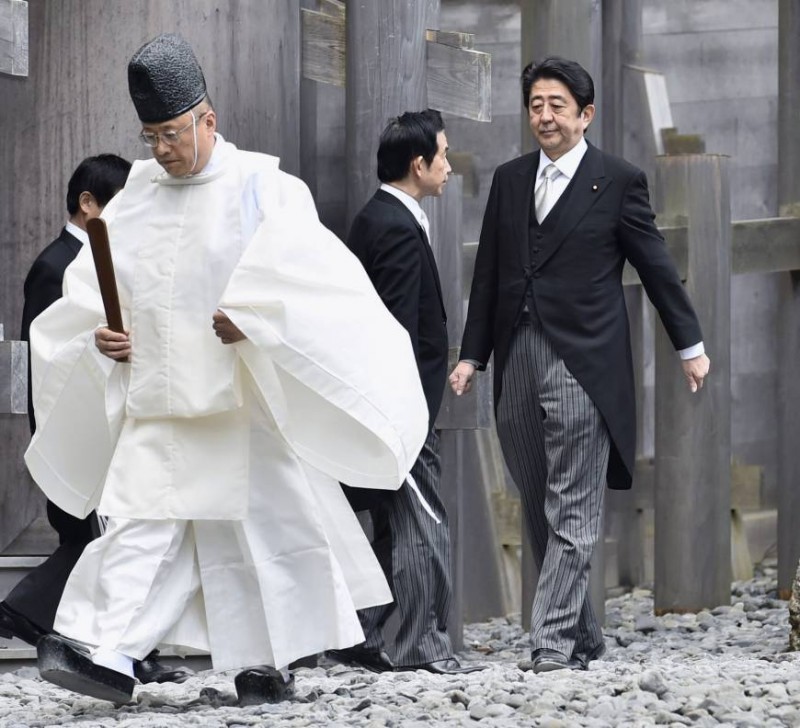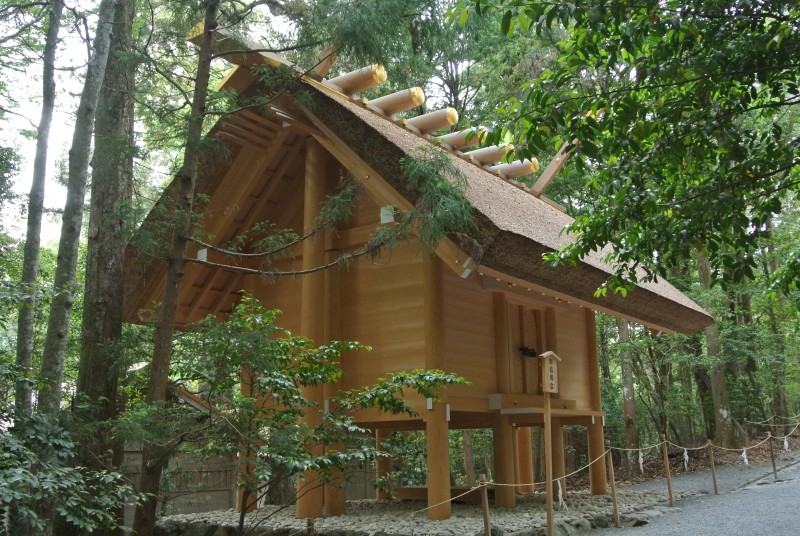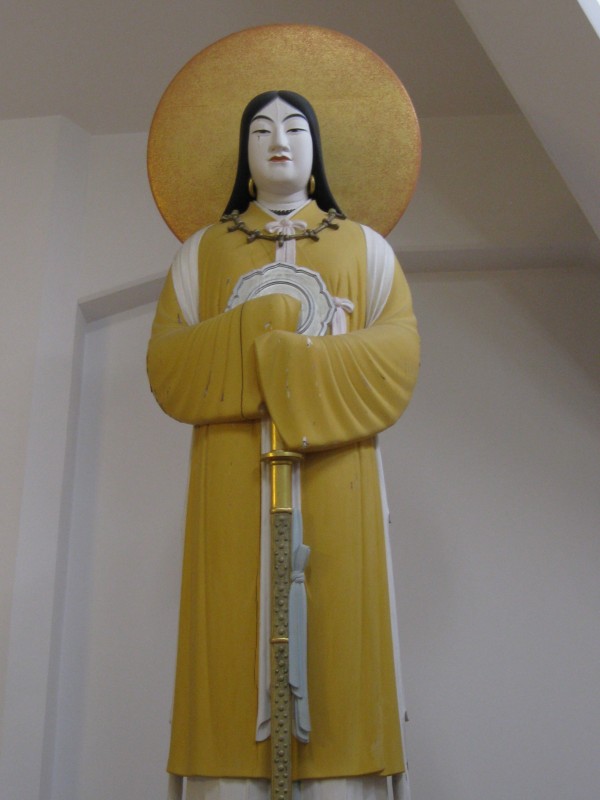An article in the Japan Times today by leading writer, Michael Hoffmann, tells of how the seemingly innocuous activities of prime minister Shinzo Abe mask a reactionary agenda which seeks to undo the Bunce Directive of 1945 severing Shinto’s ties with the State. Under the present administration, steps are underway toward reintroduction of the prewar situation by which Shinto was used as ideological underpinning for those in power. An alternative vision, which is taking hold overseas, is to see Shinto as a religion of the people, community based and environmentally oriented, a religion that looks to nature rather than the emperor as its guiding principle.

Prime Minister Shinzo Abe visits the Grand Shrines of Ise in Mie Prefecture on Jan. 4. (photo courtesy Kyodo)
Is Abe attempting to fuse the church and state?
Japan’s monarchy claims the oldest royal lineage in the world. The reigning Emperor is, theoretically and maybe even historically, Empress Jito’s descendant. So tangible a link to so remote a past is no doubt a factor in a deeply conservative strain in the national character.
“This year, too, the economy comes first,” declared Prime Minister Shinzo Abe on Jan. 3 in the course of his first news conference of 2017. That’s the way things are nowadays. Prose rules, not poetry. The Imperial pleasure-barge is gone. In its place, the economy. Empress Jito, her ministers and her court poets might have been shocked had they glimpsed such a future. To them, the way we live, our preoccupations, would have represented the decay into utter ruin of everything good, beautiful and sacred in life.

Ise buildings project a lush nature-loving and peaceful image
If Abe’s reaffirmed commitment to the economy would have left them cold, something else about the occasion — its venue — might have heartened them. The deep resonance of the backdrop seems almost clangorously at odds with the prosaic prime ministerial boilerplate. The Grand Shrines of Ise in Ise City, Mie Prefecture, comprise Shinto’s holiest site, dedicated to the worship of Japan’s most revered deity, the sun goddess Amaterasu — divine ancestress, mythologically speaking, of the Imperial house.
Abe’s New Year’s visit to Ise drew little comment. The Grand Shrines of Ise, unlike Tokyo’s Yasukuni Shrine, enshrine no war criminals, only gods. It’s beautifully innocent, innocently beautiful and very ancient, its founding dating back to Empress Jito’s time. So lacking is it in the dark associations that haunt Yasukuni that when Abe chose to host the Group of Seven summit in Ise last May, that also passed with little comment.
The gods and goddesses of Japanese myth are playful, child-like deities, neither awesome nor overpowering, and the Grand Shrines of Ise, with their architectural simplicity and lush natural setting, seem just what Abe said they were as he welcomed world leaders, high on whose summit agenda in May 2016 were global terrorism, global warming and similar threats to life as we know it. Ise, said Abe, is richly symbolic of “the beautiful nature and rich culture and traditions of Japan.”
Can a sinister issue be lurking here, beneath the serene surface? Sophia University religious scholar Susumu Shimazono raised that possibility in a discussion with the Asahi Shimbun earlier this month. Article 20 of Japan’s Constitution reads, in part: “The State and its organs shall refrain from religious education or any other religious activity.” The official attention Abe lavishes on the Grand Shrines of Ise may, Shimazono suspects, violate the constitutional separation of church and state.

Amaterasu, sun goddess and putative ancestor of the present emperor
Abe’s feelings regarding the Constitution are no secret. “Revising the Constitution,” he told reporters covering his party’s electoral victory in 2014, “has always been an objective since the Liberal Democratic Party was launched.” That was in 1955. The Constitution was then barely eight years old. Its roots in the postwar U.S. Occupation, and its largely American authorship, were an irritant to conservatives to whom imported notions of freedom and rights were less important than, if not inimical to, the native concept of Japan as “the land of the gods.”
As myth, the concept is charming; as fact, less so. Japanese militarism and the Pacific War show the extremes to which it can lead. Other questions aside, it seems grossly out of keeping with the modern spirit — and yet it was the great modernizing leaders of the Meiji Era (1868-1912) who drafted and enacted the Constitution of 1890, whose Article 3 gave new life amid a headlong plunge into industrialization, commercialization and (to paraphrase Abe) the economy coming first, to the “sacred and inviolable” nature of the Emperor.
Shimazono explains: “In building a modern state after the collapse of the shogunate” — the collapse, indeed, of the only world the isolated and dangerously out-of-touch early Meiji Japanese knew — “the political leadership needed a pillar around which to unify the nation. The pillar they erected was that of reverence for the Emperor” — the “sacred and inviolable” sovereign.
The postwar Constitution was intended in part as a hedge against any such idea ever again rearing its head in Japan to lead the nation into the amoral militarism whose wounds fester to this day.
“The Emperor shall be the symbol of the State and of the unity of the People,” declared Article 1, “deriving his position from the will of the people with whom resides sovereign power.” No more imperial divinity. Japan was no longer “the land of the gods.”
It was a steep demotion and not everyone was reconciled to it. Conservatives bided their time. Economic drift, coupled with increasing international hammering at Japan’s war guilt, played into their hands. Japan, they said, emasculated by a “foreign” constitution, had lost its soul. Has the time come to regain it? Is that what’s going on under cover of “the economy coming first”?
Shimazono expresses alarm at Abe’s brisk reversal of Japan’s postwar pacifism. His argument is not military but constitutional. New, hastily passed legislation permitting “collective self-defense” required a reinterpretation of war-renouncing Article 9 that many experts declare untenable. If Article 9 is vulnerable, Shimazono asks, might not Article 20, guaranteeing religious freedom and barring the state from “any religious activity,” be equally so?
This column last week discussed a package of articles in the March issue of Sapio magazine that snapped what seems a rose-tinted photograph of Japan as the best of countries, if it could only regain the lost confidence to see itself that way. One contributor called Japan “the world’s No. 1 paradise.” Another invoked the Meiji modernization as an inspiration to turn to. Meiji was indeed a confident era, and there have been few more so. It was, among other things, the era that made modern Japan a “land of the gods.” It’s more ominous than it sounds.

“Akie Abe vacates post at private school; board to probe land sale”, what a wonderful special discount in land prices! Was this a bribe? Who gets a 90% reduction in land prices these days in Osaka or Tokyo unless special favors are sought? A left wing liberal arts school would pay double the standard real estate price in Abe’s revisionist Japan. Uh, why not just open up a Yasukuni Shrine elementary school on the grounds of that ghoulish Shinto establishment and teach all the select students (from only the finest LDP families) pre-war Hideki Tojo militarist values? Such values as a supreme Yamato race; the Emperor as the one and only living god, divine in all things and supreme above all other humans and religions; Shintoism as the one true religion. Abe is living in the past.
What was PM Shinzo Abe thinking? Is he so disconnected from reality, from mainstream Japan, from opposing thought that he would slyly try to establish a prewar style rightwing ideological training center for impressionable young minds? What’s next, the return of the Thought Police or the Kempei tai? Poor Abe really does live in an ultra-conservative revisionist bubble—without a clue about the true nature of Japan’s wartime aggression; or if he does have a clue, Abe tries to repress such understanding in favor of myth and ancestor worship.
What if Nazi leader Hermann Goering’s grandson was the Chancellor of modern day Germany and tried to build an elementary school, one that honored the memory of Herr Goering, one of the monsters most responsible for the Holocaust? Such a leader would immediately be forced to resign and possibly face criminal prosecution for stirring up hate speech.
God help any ‘hafu’ child that tried to enroll at the Shinzo Abe Commemorative Elementary School, the poor mixed race boy or girl would be beaten to death on the playground while the teachers looked the other way. As it is, most ‘hafu’ children face horrible ijime or bullying attacks in most Mombusho managed junior and senior high schools.
Abe really is out of step with the times. He’s mad to think that the Japanese people want to revisit the repressive, fascist era of his grandfather, suspected war criminal Nobusuke Kishi. Isn’t it enough that Abe leads a political party that has ruled Japan almost unopposed since the 1960s? Must he also encourage the growth of an education system that embraces prewar values? One day there will be absolutely NO opposition to LDP rule since it will be ruled unpatriotic and an affront to the divine will of the emperor, an ‘enlightened’ emperor who regularly visits Yasukuni Shrine. Abe wants to consolidate the power of his ruling elite and end all political or social opposition “for the good of the nation”. He’ll have his “Beautiful Japan” at long last and bring an end to that messy, chaotic American style democracy that his grandfather had to endure in the 1950s.
by Robert McKinney (former ESL instructor at Waseda University)
By SUSUMU SAKAMOTO/ Staff Writer
February 24, 2017
First lady Akie Abe has resigned as honorary principal of an elementary school, Prime Minister Shinzo Abe said, as he tried to distance himself from a scandal over a land deal involving the school’s operator.
“My wife submitted a request to resign from the post out of concerns that by taking on the position of honorary principal she would continue to cause problems for the children who attend the school as well as their parents,” Abe said Feb. 24 at the Lower House Budget Committee.
He was responding to questions by Nobuyuki Fukushima of the opposition Democratic Party about the relationship between the private school operator, Moritomo Gakuen, and the first lady.
The previous day, Moritomo Gakuen, based in Osaka Prefecture, quietly removed all references to Akie Abe from the website for the Shinto-based elementary school, which is scheduled to open in Toyonaka, Osaka Prefecture, in April.
But the scandal shows no signs of going away.
The Board of Audit indicated on Feb. 23 that it will conduct an investigation into the sale of the land by a Finance Ministry bureau to Moritomo Gakuen in June 2016 for the elementary school.
Yuichiro Tamaki, a Democratic Party lawmaker, demanded details behind the bureau’s decision to set the price at 134 million yen (about $1.2 million) for the land, about 10 percent of the appraised value of neighboring plots.
Opposition lawmakers have also raised questions about whether politicians were involved in the transaction.
Abe explained that after Akie gave a lecture at a Moritomo Gakuen-operated kindergarten in 2015, Yasunori Kagoike, the head director of the organization, asked her to take on the honorary principal position for the elementary school.
The prime minister also explained that he had complained to Moritomo Gakuen for trying to collect donations by describing the new elementary school as the “Shinzo Abe Commemorative Elementary School.”
“It is extremely regrettable that my name was used in that manner despite my repeated requests to stop it,” Abe said at the Lower House Budget Committee session.
He was also asked about the questionable land sale involving Moritomo Gakuen.
“I am of the understanding that (the Board of Audit) will fulfill its role through an investigation as an independent authority separate from the central government,” Abe said.
He also said the Finance Ministry bureau and a transport ministry bureau that once owned the land in question would reinvestigate the sale to Moritomo Gakuen.
The prime minister had taken a different stance just a week ago.
At the Lower House Budget Committee session held on Feb. 17, Abe said, “My wife told me that the eagerness toward education held by the teachers at Moritomo Gakuen was outstanding.”
He also expressed surprise when Fukushima asked him at that same committee session about the use of his name by Moritomo Gakuen to gather donations.
Deleted items from the “Greetings” section of the elementary school’s website included a photo of Akie as well as the fact that she would be honorary principal.
Moritomo Gakuen also removed a passage near the photo that said, “We will foster children who hold pride in being Japanese and have a solid backbone.”
I dunno, I think it wouldn’t be that bad what Abe is planning. Time will tell.
This is a prime minister who has cut back personal liberties, curtailed the press by its secrecy laws, had people sacked from television jobs who were critical of the government, boosted Japan’s military, belongs to an organisation that seeks to reintroduce State Shinto, and whose wife contributed to an openly fascistic elementary school. How much time exactly do you want to give him?
” Is Abe attempting to fuse the church and state? ”
That’s extremely rich from an American. Especially considering that 1° it was precisely the consequence of Protestantism; and 2° that Freemasonry, in countries where it is proeminent, as well as in Israel (a country founded for Jewish people… and therefore for those who consider their Religion to be Judaism), there is a crypto-clergy who as since long ago fused with the state; 3° the US is not really as rich as it looks like, it merely as a lot of natural ressources and a lot of Monopoly bank notes.